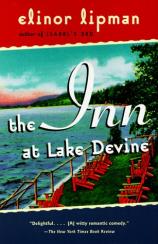Reading Group Guide
Discussion Questions
The Inn at Lake Devine

1. What fascinates Natalie most about the offensive note from Mrs. Berry is its "marriage of good manners and anti-Semitism" [p. 4]. Does Natalie show, later in the novel, what truly having "good manners" might mean?
2. What does Natalie mean when she mentions the "Gentile ambitions" [p. 65] that led her into a friendship with Robin Fife?
3. Although Eddie and Audrey Marx are both Jewish, they were originally drawn together because of their differences. For the spritelike Audrey, "there was something . . . about Eddie's jumbo presence, something like a bodyguard's or a football player's, that was normally off limits to a Jewish girl" [p. 19]. They were forced to marry when Audrey became pregnant at nineteen. Given the circumstances of their own history together, are Natalie's parents hypocritical in trying to stop Natalie from seeing Kris Berry?
4. Natalie says that her sister, Pamela, in marrying a Catholic (in a Catholic mass, no less), "used up our family's mixed-marriage chit, even our liberal-dating chit. It was up to me to bring home the perfect Jewish son-in-law" [p. 144]. Are Jewish parents more insistent than others about keeping their children from marrying outside their faith? If so, why?
5. The Inn at Lake Devine might be called a "revenge comedy." At the end the Berrys lose the Inn, and both of their sons take up with Jewish women. Is this a fitting comic closure for Ingrid Berry? What about the feckless but kind Mr. Berry, who loses his business because of carelessness in mushroom hunting? Should he have been more active in preventing his wife's exclusion of Jews from the hotel?
6. What are the social and class markers that Lipman uses to create a sense of realism at the Halseeyon and at the Inn at Lake Devine? How well do Kris and Nelson Berry respond to their weekend immersion in Jewish culture when they visit the Halseeyon with Natalie?
7. What role does food play in this novel? How do the significance and style of dining differ among social groups at Lake Devine and at the Halseeyon? Does food have more meaning for the Jews in the Catskills than it does for the WASPs in New England? What does the desire to be a chef reveal about Natalie's character?
8. At camp, Natalie first befriends Robin Fife in the hope of being invited by her family to the Inn at Lake Devine, but she is bored by the dull-witted Robin who, she notes, "couldn't take, make, or get a joke of any kind" [p. 41]. Her relationship with Robin at fourteen could be seen as mere opportunism; how does this change when they meet again ten years later?
9. Why do you suppose Elinor Lipman has chosen to leave out any details of Natalie's college years, including her experience of dating and sex?
10. The novel of the Jewish person coming of age in modern America--the most famous examples are Philip Roth's Portnoy's Complaint and Mordecai Richler's The Apprenticeship of Duddy Kravitz--is usually told from a young man's perspective. How does the shift to a female narrator in The Inn at Lake Devine challenge and transform this tradition?
11. Do some of the characters come across as more true to life than others? Which of the three families--Marx, Fife, or Berry--seems most realistically depicted? Does the role of surprise in the novel feel realistic? Does the unexpected always work? Does it add or detract from your enjoyment of the story?
12. This novel is based upon the reality of intermarriage and assimilation in American life, issues that are especially painful among the more observant Jewish communities. Lipman expertly draws the difference between the habits of Natalie's Reform family and those of her Orthodox friend Linette Feldman. Is it easier to feel good about the pairing of Natalie and Kris than that of Linette and Nelson? Do you feel that love rightly triumphs over religion in this novel?
13. One reviewer of this novel wrote, "Prejudice, in all its many disguises, is an unusually worthy but often ponderous subject; its very weightiness . . . often threatens to sink otherwise well-written and well-meaning tales."1 What aspects of Lipman's style allow her to avoid this pitfall?
14. What do you find most satisfying about the way that Lipman brings her plot to closure?
15. In a recent interview Elinor Lipman said, "I like novels that are funny, quirky, intelligent, and humane."2 How well, for you, does The Inn at Lake Devine fit this description?
The Inn at Lake Devine
- Publication Date: April 27, 1999
- Paperback: 272 pages
- Publisher: Vintage
- ISBN-10: 037570485X
- ISBN-13: 9780375704857








